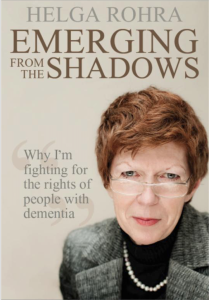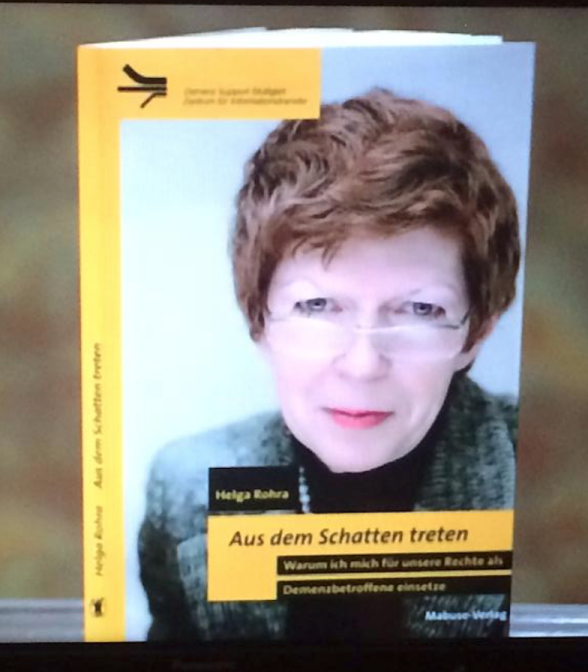Stepping Out of the Shadows: Why I am Advocating for the Rights of People with Dementia
 This week, we are publishing an excerpt of one of our Board members book, Ms Helga Rohra, translated from the original German, by Peter Mittler.
This week, we are publishing an excerpt of one of our Board members book, Ms Helga Rohra, translated from the original German, by Peter Mittler.
Thank you Helga for sharing it, and thank you Peter for translating it. It is excellent to report that the book is to be translated into English soon.
Helga Rohra: Stepping Out of the Shadows: Why I am Advocating for the Rights of People with Dementia.: Mabuse Verlag, Kasseler Str. 1a, 60486 Frankfort am Main; Tel. 069-70-79-63-13. 2011; e-reader 2014.
INTRODUCTION
"My name is Helga Rohra. I am 62 years old, a single parent and simultaneous translator and have been living with a diagnosis of dementia for more than seven years. I would like to convey to you how this diagnosis has turned my life upside down, the challenges I have to confront and how I have succeeded in giving meaning to my life.
But don’t worry, my journey is neither a horror story about the long road to oblivion nor an account of the hardships encountered; quite the contrary.
If you yourself are living with dementia or are aware of symptoms suggestive of dementia, allow me to tell you: dementia is not the end! Even with dementia, you can lead a full and enriched life if you can come to terms with your difficulties. I don’t want to sugar-coat anything. Dementia is not child’s play. It makes new demands on you every day. But believe me, you can live with it.
If you come into contact with people with dementia or work with them as a professional or as a member of an organisation, I invite you to listen to what I have to say. Reading this book may help you to arrive at an understanding of the early stages of a dementia journey. But be warned! In some of these experiences, our supporters receive a mild reprimand which should not be seen as an attack but as constructive criticism.
First and foremost, I am speaking for myself in reporting on my experiences as an activist. Others will interpret their experiences in different ways. I make no claims for the universal validity of any generalisations which I have been unable to resist. I particularly want to draw attention to the particular life situation of younger people with dementia because our needs may differ from those of older people – a rarely discussed issue, in my opinion.
On the many occasions when I am asked how my life has been changed by dementia, I find it difficult to provide an answer. I might be asked to reflect on something that was once important to me and consider whether or not it remains important. These processes are challenging. Memories are unreliable for all of us, not just people with dementia. We all have cause to question whether our memories correspond to the truth. Consciously or unconsciously, most of us treasure our successes and supress our setbacks. Each re-telling of a story differs slightly from its predecessor because any story from the past reflects the experience of the present. This happens to all of us but dementia makes it harder to remember.
For me, the past is no longer the firm rock on which to build the present. There are times when the search for memories is like walking on a bog that seems firm and safe but can suddenly swallow and then release you. So the answer to the question about life changes brought about by dementia always depends on what I can remember at the moment when the question is asked. That is the reason why I need to explain how I came to write this book.
I would like to be able to tell you that it was publishers who asked me to write this book, that I was delighted to accept their offer and immediately sat at my desk and feverishly began to write. Sadly, it was not that simple. Dementia has made it so difficult for me to conjure up memories that I no longer feel able to write about them. Certainly, I was asked if I wanted to convey my experiences as a person affected by dementia. Easy as it still is for me to talk about my experiences, dementia has robbed me of the ability to write longer passages about them.
So how were my spoken words and scribbled notes to become the book that you are now reading? The simplest solution seemed to be the kind of ghost writer who assumes full responsibility for writing but remains invisible. Such a role was unacceptable both to me and to the publisher because I did not want to give the impression that I had written the book from beginning to end.
My book partner is Falko Piest who styles himself as my writing assistant – a role he had successfully carried out for an earlier book to which I had contributed. We got to know one another in 2009 and worked together to produce a chapter in I Speak for Myself: People with Dementia Speak Out which at that time was published under my pseudonym Helen Merlin. Since then, he and I have become an experienced team, writing several articles and taking part in many public events. As a member of the Stuttgart Dementia Support Group promoting the participation and voice of people with dementia, Falko Piest has a strong professional involvement in the perspective of people affected by dementia.
To produce this book, Falko listened to me for hours on end, asked me many questions and held long discussions with me. What follows is the outcome of many tape recordings of our conversations, together with my notes and diary entries - not piece by piece or chronologically but in chapters. Every time an episode was described, he sent me the text for comments and suggestions for changes. Gradually and step by step, a complete book was created."
